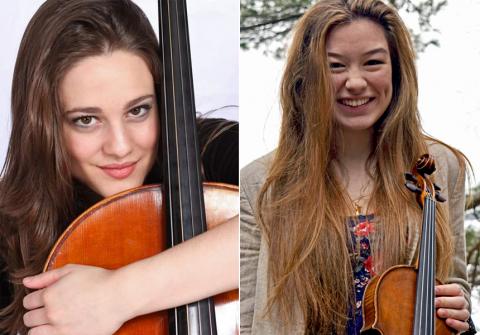Boston Conservatory String Students Shine at the Massachusetts String Teachers Association's Masters Solo Competition

Elisa R. Sadaba (B.M. '17, cello), left, won the Grand Prize, as well as the the Audience Favorite prize. Montserrat Siles (B.M. '20, violin), right, won Best Contemporary Performance in the Senior Division.
Boston Conservatory at Berklee string students shone brightly at the third annual Massachusetts String Teachers Association's (MA-ASTA) Masters Solo Competition, which took place on campus on March 18. Elisa R. Sadaba (B.M. '17, cello) won the Grand Prize, as well as the the Audience Favorite prize. Montserrat Siles (B.M. '20, violin) was judged the Best Contemporary Performance in the Senior Division.
For Sadaba and Siles, the competition represents another important benefit: the opportunity to perform and focus long hours of practice to attain a goal. As Rhonda Rider, Boston Conservatory chair of strings and Sadaba’s teacher, explains, “It’s always important for young musicians to perform. They spend a lot of time practicing, and competitions help focus that work.”
Siles was hesitant about entering the competition. “At first I was a little scared, but my teacher, Markus Placci, encouraged me to try.” The experience in itself was rewarding, but was made sweeter by victory.
Sadaba, who will graduate with a B.M. from the Conservatory in May, will simultaneously receive a master’s degree from Yale University. Although she practices diligently, she says performing for friends is what enables her to play for an audience such as that at the MA-ASTA competition. “It puts you in the position of needing to be very clear and convincing,” Sadaba says. “You have to create performance opportunities” to be able to handle the pressure of being on stage. Her winning performance was Shostakovich's Concerto No.1.
Originally from San Sebastian, Spain, Sadaba auditioned and was accepted at Yale when she was 17 to study with the well-known cellist Aldo Parisot. Yale does not offer a bachelor’s degree in music, and she says Parisot insisted that she come to Boston Conservatory to study with Rider. The experience, says Sadaba, has been wonderful, adding that she has learned so much from Rider, both musically and about life. “Elisa is wonderful cellist and very expressive,” Rider says. “She works on her technique so nothing gets in the way of her playing. I’m not at all surprised she won.”
Siles, who is from Costa Rica, came to the United States at 16 to study at the Interlochen Music Academy in Michigan. Now a freshman at the Conservatory, Siles says she and her teacher, Placci, had chosen the contemporary piece, “Subito,” by Witold Lutoslawski, because of its interesting techniques.
Building repertory and exploring new challenges is why Placci encouraged Siles to enter the competition. This was one of the first contemporary pieces she had performed publically and “she did great,” Placci notes. “Competitions may be stressful, but the experience gets the musician out there to be noticed. It’s the closest thing to a professional performance.”
Sharan Leventhal, a Boston Conservatory faculty member and one of the organizers of the competition, sees it as “a great opportunity to display talent.” It also gives young musicians a chance to hear their colleagues perform. And since the final competition is open to the public, a wider audience hears the musicians.
Boston Conservatory students have fared well at past MA-ASTA solo competitions. Last year, cellist Nathaniel Taylor (B.M. '15, G.P.D. '17) split the Grand Prize with another competitor. In 2014, violist Eric Hollander (B.M. '14), won Second Prize, and violinist Dillon Robb (B.M. '17, M.M. '17) won Best Contemporary Performance in the Senior Division. Later this spring, Sadaba and Taylor will perform at the Kennedy Center in Washington, D.C. as part of a popular Boston Conservatory cello group called BoCoCelli. Sadaba says the performance will be another adventure, since they’ll be playing tango and show pieces. “It’s big step,” she says.
Both Sadaba and Siles agree that their experiences studying at Boston Conservatory have been invaluable. “When I go to school,” says Sadaba, “I don’t think of it as school. I think of it as going home.”
